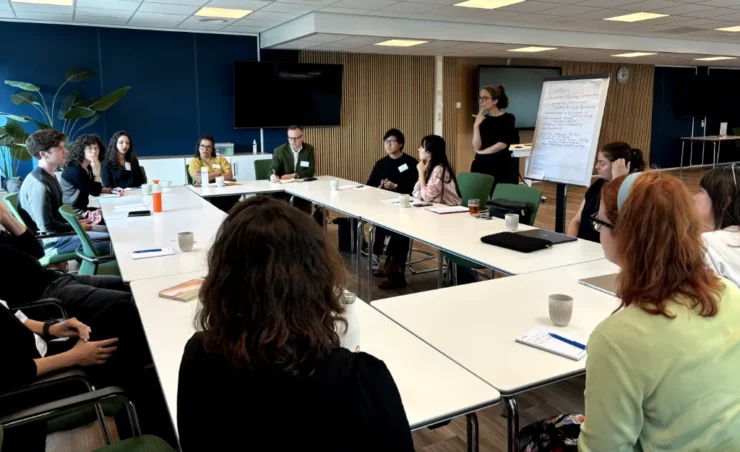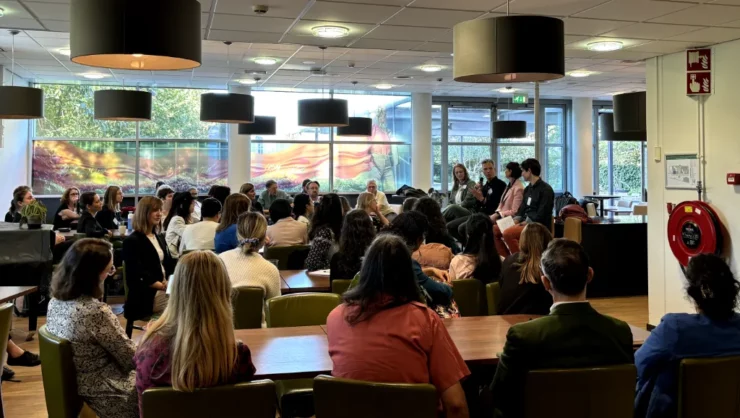On September 20, 2024 the first national meeting on the sectorplan theme of ‘Cultural Heritage & Identity’ was held in Rotterdam, to share knowledge and discuss developments. During the day, promising ideas for collaboration emerged.
What is a sectorplan theme?
The Social Sciences & Humanities (SSH) are united in a ‘domain’, which consists of four sectors: economics, humanities, law, and the social sciences. These sectors all created sectorplans – shared plans for education and science, which aim to tackle various social issues or themes.
A theme of the sectorplan of the humanities is ‘Cultural Heritage & Identity’. Tilburg University, Maastricht University, Groningen University, Radboud University, Utrecht University, University of Amsterdam, Open University, Leiden University, VU Amsterdam and Erasmus University Rotterdam are involved in this theme.
What is heritage?
The current understanding of heritage is that it is a dynamic collection of diverse forms of culture, both tangible and intangible, that within a community are considered as representative for a shared history and identity. Researcher moved beyond the idea of heritage as a collection of (material) buildings.

Why does ‘cultural heritage and identity’ matter?
The Netherlands has an evolving identity and diverse society. Significant portions of the population come from various ethnic backgrounds. Researching cultural heritage can help bridge gaps between different communities and foster a sense of shared identity while respecting diversity. This is, of course, a complex and challenging endeavor.
Research can inspire new ways of understanding Dutch history (colonialism) through a more inclusive lens. By exploring cultural heritage, researchers – among other aims – seek to contribute to an inclusive society where different identities are respected, understood, and valued, reducing social tensions and promoting inclusivity.
What happened during this sectorplan day?
The day was hosted by Erasmus University Rotterdam (EUR) and organized by Christel Theunissen (Research office, EUR), Jennifer Schijf (Secretary Council of Deans in Arts and Humanities), Naomi Oosterman (Assistant Professor, EUR), Sean Smith (Assistant Professor, Tilburg), Stacey Copeland (Assistant Professor, RUG) and László Munteán (Assistant Professor, Nijmegen).
Approximately ninety people attended, representing all universities involved in the theme ‘heritage and identity’ in the Netherlands. All deans involved with the sectorplan attended. Attendees also came from the professional heritage sector.
The day was opened by Thony Visser (dean, RUG) and Martine van Selm (dean, EUR). Stijn Reijnders (Professor of Cultural Heritage) provided the opening lecture. During the opening lecture, representatives of all universities briefly presented their research focus for the sectorplan, their best practices, and their current research lines. It was the first time that all universities came together to discuss this, which gave a good overview of heritage and identity related research in the Netherlands.

Key insights
The rest of the program consisted of roundtables dedicated to research, education, and impact and a variety of workshops that participants could choose from. A specialist from Erasmus Engagement Research services offered a workshop on national research collaboration. The University of Amsterdam’s Institute for Interdisciplinary Studies offered a workshop on cross-disciplinary collaboration and joint teaching in education, and the Erasmus University’s team of Evaluating Societal Impact discussed the usefulness and application of a joint impact plan.
The Netherlands has a very strong and diverse network of heritage scholarship and all departments and individuals are eager to work together on the established theme. There is a lot of willingness to develop novel educational curricula, to collaborate on grant applications, and to strengthen already existing partnership. There is a lot of focus on societal impact and participants are involved in creating societal impact. There is a strong incentive to strengthen this.
This day generated fruitful ideas, such as:
- creating an interuniversity minor around cultural heritage and identity;
- establishing visiting lectureships on cultural heritage and identity;
- founding a national research school dedicated to heritage;
- increasing collaboration with professional heritage partners;
- establishing research consortia with universities and partners;
- building a co-creative impact platform – an open space for dialogue between researchers and other communities, so as to co-create social progress instead of imposing solutions.
With this day, we have taken a significant step towards bringing heritage scientists together in order to collectively achieve the objectives of the sectorplan.
